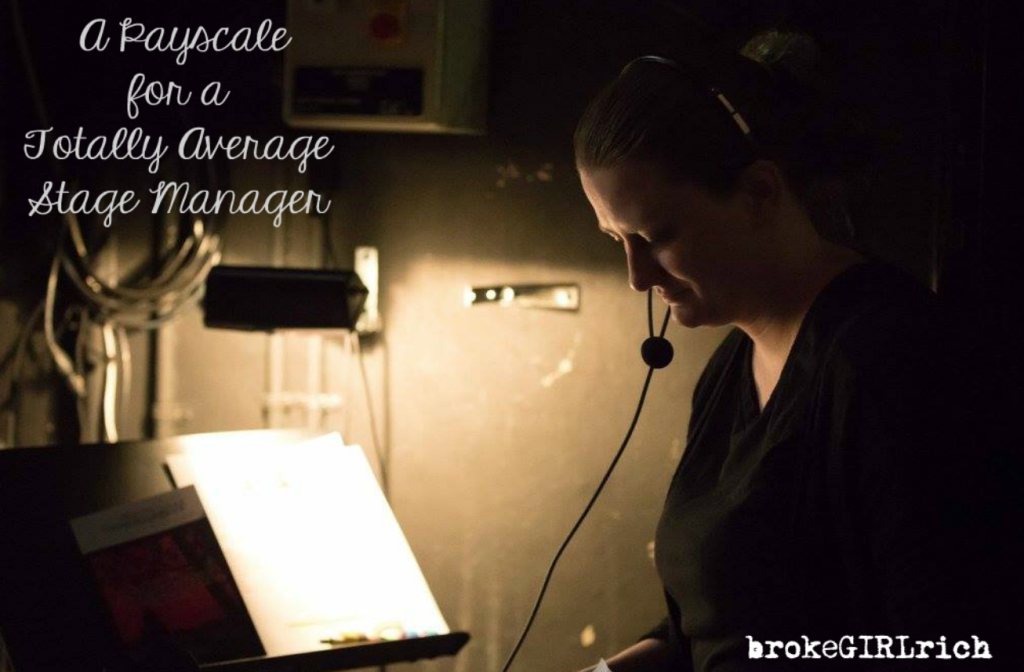About three years ago, I wrote a post about what it feels like to get used to the idea that income fluctuates crazily when you’re a stage manager. I’ve been feeling that again as I think about leaving my current job.
Over the summer, I wrote a post celebrating 10 years since I started ships, and looking back on the seasons of stage management over those 10 years (and the 4 before it since the first time I ever got paid to stage manage), I can definitely confirm that the income situation is strange.
On the plus side, I think I’m like… 99% close to mastering it, which means I’ve built up some really, really good habits.
I also feel like I’m really nothing special. I lucked out and had a phenomenal stage management professor in college, but I’m sure others did too. Other than that, I just worked hard and tried to always do what I said I was going to do.
Anyway, here’s a slightly simplified income list:
Year One of Stage Management (Senior Year of College)
- College Dance Department Stage Manager – $7.25/hour for approximately 40 hours my last semester = $290 (to date – still the most exciting money I’ve ever made as a stage manager. I couldn’t believe they would pay me.)
- Other Income: Student Stage Hand and Occasional Substitute Teacher
Year Two of Stage Management (First Year of Grad School)
- Small Touring Theatre Company – $500/month for 6 months a year
- Other Income: Occasional Substitute Teacher
Year Three of Stage Management (Second Year of Grad School)
- Small Touring Theatre Company – $500/month for 6 months a year
- Other Income: Occasional Substitute Teacher
Year Four of Stage Management (Third Year of Grad School)
- Volunteer Stage Manager for Friend’s Project = $0
- Other Income: Insurance Agent at Call Center and Occasional Substitute Teacher
Year Five of Stage Management
- Cruise Ships: $90/day
Year Six of Stage Management
- Cruise Ships: $90/day
Year Seven of Stage Management
- Cruise Ships: $115/day
- Other Income: School Tour Guide
Year Eight of Stage Management
- Cruise Ships: $125/day
Year Nine of Stage Management
- Circus: $38,000/year
- Other Income: Mystery Shopping
Year Ten of Stage Management
- Tiny Experimental Theatre Show: $450
- Other Income: Production Management, Mystery Shopping, Freelance Writing, Blogging
Year Eleven of Stage Management
- (School Year) Children’s Theatre: $700/week with $30/day per diem
- (Summer) Crazy Experimental Theatre Show: $175/show
- Other Income: Occasional Substitute Teaching, Freelance Writing, Blogging
Year Twelve of Stage Management
- (School Year) Children’s Theatre: $700/week with $30/day per diem
- (Winter Layoff) ASM on Quick Tour: $4,000
- (Summer) Opera: $3,300
- (Summer) Children’s Conservatory Program: $375/week
- Other Income: Freelance Writing, Blogging
Year Thirteen of Stage Management
- Non-Equity National Tour: $1,000/week
- 3 Months of Unemployment
- Small Regional Theatre: $400/week
- Regional Opera ASM/Props: $1,500
- New York Show: $115/show (7-8 shows a week)
- Other Income: Freelance Writing, Blogging, Occasional Substitute Teaching, Transcription, Brand Ambassador
Year Fourteen of Stage Management
- Circus: $70,000/year
- Other Income: Blogging
Year Fifteen of Stage Management
- Circus: $70,000/year
- Other Income: Blogging
Some things that I’ve learned over the years that have made a big difference in my financial picture:
- I hate debt. I hated working for that first circus and the idea that I had to because I had to pay off debt made me so depressed I vowed to not let that happen again.
- I always try to have things paid off ahead, even if it means a month or two of struggle at the beginning of something – I try to pay rent on the first day of each month instead of the last. As soon as I pay off my car insurance for the year, I prioritize saving up the amount for the next year. I try to pay off my credit card every payday instead of once a month.
- I set savings goals and then I prioritize them in order of importance. That way when my income changes and I have to make adjustments to my goals, I already know which ones will have to wait till next year.
- I try to hit my savings goals before doing much extra spending. I’m not saying I never do anything fun through the year until those goals are hit, but I don’t look at my bank account and think I have “extra” until all those goals are funded. It’s ok to have a goal be a trip or something fun too though.
- After my immediate bills (rent, insurance, food, utilities), I prioritize saving for retirement. The magic of compound interest is no joke. I’ve aimed to max out my IRA every year since I was 25 and even just 9 years later, hitting that goal each year has made a big difference – and I can start to see the money just making itself.
- I track things. I track my net worth each month. I write down my goals and cross them off when I achieve them. I make sure I know my money situation so I can make adjustments when necessary.
If you’re thinking about becoming a stage manager but the horror stories about what you’ll make are freaking you out, I hope this helps you feel a little better.
There are definitely ways to make a good living in the arts, especially if you take advantage of some of the jobs that provide housing when you’re just starting out (or, you know, fifteen years in, like me right now).
Letting go of the Broadway or bust mentality helps too. My goal has always been just to make enough to get by.
So far, so good.




